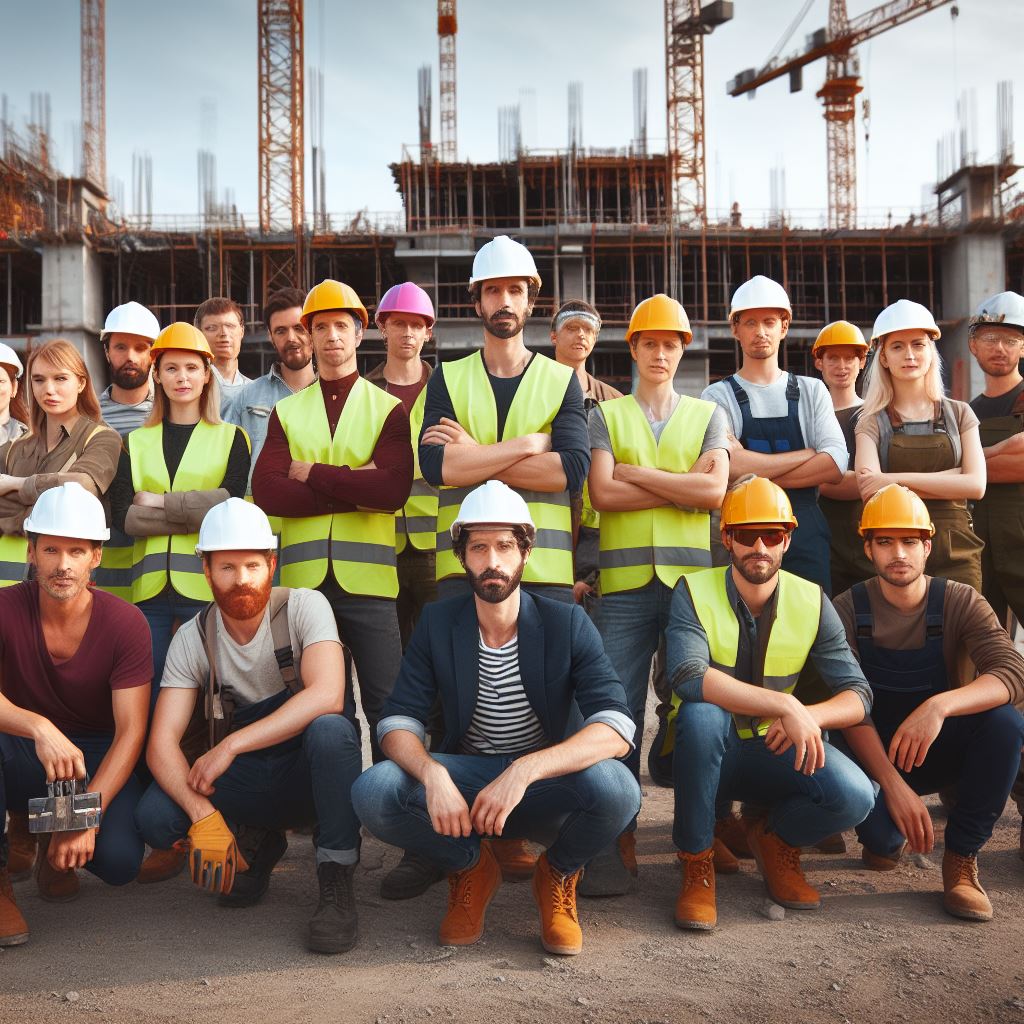Introduction
Health and fitness play a crucial role in construction work, ensuring optimal performance and safety.
It is essential to stay physically fit and mentally sharp in demanding construction jobs.
In the world of construction, health and fitness are paramount for several reasons:
- Physical Demands: Construction work is physically taxing, requiring strength, endurance, and flexibility to handle heavy materials and equipment.
- Safety First: A fit body is less prone to accidents, reducing the risk of on-site injuries.
- Efficiency: Maintaining good health enhances productivity, ensuring tasks are completed promptly.
- Mental Alertness: Construction projects demand mental acuity to make quick decisions, solve problems, and communicate effectively.
- Stress Management: Physical fitness aids in stress reduction, vital for the high-pressure construction environment.
- Longevity: Staying fit promotes a longer, healthier career in construction without early burnout.
- Teamwork: Collaboration and coordination on-site are smoother when everyone is in good health and shape.
- Adaptability: The construction landscape is ever-changing; a fit body and sharp mind adapt to new challenges.
To excel in demanding construction jobs, prioritize health and fitness. Your body and mind are your most valuable tools.
Physical Demands of Construction Work
Construction work is known for its physically demanding nature, requiring individuals to possess strength, endurance, and flexibility.
Tasks that require strength, endurance, and flexibility
- Lifting heavy materials and equipment
- Carrying and moving objects from one location to another
- Using power tools to cut, shape, and assemble materials
- Climbing ladders and scaffolding to reach higher areas
- Bending, kneeling, and squatting to work in various positions
These tasks can put a significant amount of strain on the body, requiring workers to be physically fit.
Having a physically fit body is crucial in construction work as it helps individuals perform tasks safely and efficiently.
Importance of a physically fit body
- Reduced risk of injuries: A strong and flexible body is less prone to strains, sprains, and other common construction-related injuries.
- Improved stamina: Endurance is essential in construction work to maintain productivity throughout the day.
- Better productivity: Being physically fit allows workers to complete tasks efficiently, leading to increased productivity.
- Enhanced safety: A fit body can handle the physical demands of construction work, reducing the chances of accidents and hazards.
- Longevity in the industry: Maintaining good health and fitness levels enables workers to have a long and successful career in construction.
To achieve and maintain physical fitness, construction workers should incorporate regular exercise and healthy lifestyle habits into their daily routine.
Exercise recommendations for construction workers
- Strength training: Engage in activities that build muscle strength, such as weightlifting or resistance training.
- Cardiovascular exercise: Perform activities like running, cycling, or swimming to enhance endurance.
- Flexibility exercises: Incorporate stretching exercises like yoga or Pilates to improve flexibility.
- Proper nutrition: Maintain a balanced diet rich in proteins, carbohydrates, and vitamins to support overall fitness.
- Hydration: Drink an adequate amount of water throughout the day to keep the body hydrated and prevent fatigue.
By following these recommendations, construction workers can ensure they have the physical ability to meet the demands of their work.
Construction work requires individuals to possess strength, endurance, and flexibility.
Having a physically fit body is crucial for performing tasks safely, efficiently, and reducing the risk of injuries.
By incorporating exercise and healthy lifestyle habits, construction workers can maintain their physical fitness and have a long-lasting career in the industry.
Read: How to Launch Your Carpentry Business in the USA
Injury Prevention and Safety Measures
When it comes to construction work, injury prevention plays a crucial role in keeping workers safe and healthy.
The construction industry is known for its demanding physical labor, which can put workers at risk of various injuries.
Importance of Injury Prevention in Construction Work
Injury prevention is vital in construction work to ensure the well-being of the workers and maintain productivity on the job site.
By implementing proper safety measures, construction companies can reduce accidents and injuries significantly.
Common Injuries in the Construction Industry
Construction work involves several activities that may lead to injuries.
Some common injuries in the construction industry include falls from heights, electrical accidents, machinery accidents, and musculoskeletal injuries.
- Falls from heights: Working on elevated platforms or scaffolding without proper fall protection can result in severe injuries or even fatalities.
- Electrical accidents: Incorrect handling of electrical equipment or contact with live wires can cause electric shocks, burns, and even death.
- Machinery accidents: Improper use or faulty maintenance of machinery can lead to serious injuries, such as amputations or crush injuries.
- Musculoskeletal injuries: Lifting heavy objects, repetitive motions, and poor ergonomics can cause muscle strains, back pain, and other musculoskeletal disorders.
Tips and Strategies for Preventing Injuries
Preventing injuries is possible with the right safety measures in place. Here are some tips and strategies that construction workers can follow:
- Wear appropriate protective gear: Always wear personal protective equipment (PPE) such as hard hats, safety goggles, gloves, and steel-toed boots to reduce the risk of head injuries, eye injuries, hand injuries, and foot injuries.
- Practice proper lifting techniques: Use your legs, not your back, when lifting heavy objects.
Bend at the knees, keep the load close to your body, and avoid twisting while lifting. - Stay aware of your surroundings: Be cautious of potential hazards and obstacles on the construction site.
By staying alert and aware, you can prevent accidents. - Take regular breaks: Fatigue can increase the likelihood of accidents.
Take short breaks to rest and recharge your energy throughout the day. - Receive proper training: Ensure that all workers receive adequate training on safety protocols, machinery operation, and emergency procedures.
Role of Health and Fitness in Injury Prevention
Maintaining good health and fitness levels is essential for construction workers to reduce the risk of accidents and injuries.
Physical fitness improves balance, strength, and flexibility, making workers less susceptible to falls and strains.
It also enhances endurance, allowing workers to perform tasks efficiently without excessive fatigue.
Moreover, focusing on overall health by eating nutritious food, getting enough sleep, and managing stress levels can boost the immune system and improve overall well-being, reducing the chances of illness or injuries.
Transform Your Career Today
Unlock a personalized career strategy that drives real results. Get tailored advice and a roadmap designed just for you.
Start NowIn essence, injury prevention should be a top priority in construction work.
By understanding and addressing the common injuries, following safety protocols, and maintaining good health and fitness, both workers and construction companies can create a safer and more productive work environment.
Read: Specialized Niches: Exploring Unique Carpentry Fields

Benefits of Regular Exercise for Construction Workers
Regular exercise offers numerous direct benefits for construction workers, enabling them to meet the physical demands of their work more effectively
Improved Muscular Strength and Endurance
Construction workers often need to lift heavy objects, such as building materials and equipment.
Regular exercise helps to develop and increase their muscular strength, making it easier to handle these heavy loads.
Additionally, exercise also improves muscular endurance, allowing construction workers to perform repetitive tasks for longer periods without experiencing excessive fatigue.
Increased Cardiovascular Fitness
The physical demands of construction work often require workers to engage in intense activities for extended periods.
Regular exercise, especially cardiovascular exercises like running, cycling, or swimming, improve cardiovascular fitness.
This increased cardiovascular fitness allows construction workers to cope better with the demands of their job, ensuring they have the stamina and energy to perform tasks efficiently.
Enhanced Flexibility and Mobility
Construction work involves a range of movements and positions, such as bending, twisting, and reaching.
Regular exercise helps to improve flexibility and mobility, enabling workers to perform these tasks more easily and with reduced risk of injury.
Exercises such as yoga or stretching routines can specifically target and improve flexibility, allowing construction workers to move more comfortably and with a greater range of motion.
Mental Health Benefits
Construction work can also take a toll on a worker’s mental health due to its demanding nature and high-stress levels.
Regular exercise, however, offers various mental health benefits that can help alleviate these pressures.
Exercise is known to reduce stress levels and release endorphins, the body’s natural mood-boosting chemicals.
Engaging in regular physical activity can improve a construction worker’s overall well-being, reduce anxiety, and enhance their ability to concentrate on tasks.
Regular exercise is not only beneficial for one’s overall health but also plays a crucial role in ensuring construction workers can meet the demands of their physically challenging occupation.
By improving muscular strength and endurance, increasing cardiovascular fitness, enhancing flexibility and mobility, and providing mental health benefits, exercise equips construction workers with the physical and mental capacity required to excel in their work.
Read: Carpentry Certifications: Boosting Your Career in the US
Nutrition and Hydration for Construction Workers
Proper nutrition and hydration play a crucial role in ensuring the overall well-being and performance of construction workers.
A balanced diet is essential to fuel the body for the strenuous physical demands of their work.
Importance of Proper Nutrition
- Nutrition is vital for construction workers as it provides energy and helps prevent fatigue.
- A well-balanced diet with adequate protein, carbohydrates, and fats supports muscle recovery and growth.
- Incorporating fruits and vegetables into meals boosts the immune system and reduces the risk of illnesses.
- Proper nutrition enhances concentration, alertness, and overall cognitive function.
Tips for Maintaining a Healthy Diet
- Plan meals in advance to ensure a variety of fresh, nutritious options.
- Pack homemade meals and snacks to avoid relying on unhealthy fast food.
- Choose whole grain products such as whole wheat bread and brown rice for sustained energy.
- Incorporate lean sources of protein like chicken, fish, and beans into meals.
- Include healthy fats from sources like avocados, nuts, and olive oil.
- Avoid sugary drinks and opt for water or natural fruit juices instead.
Importance of Staying Hydrated
- Construction workers often work in hot and humid conditions, leading to increased sweating.
- Staying hydrated is crucial to prevent dehydration, heat exhaustion, and heat stroke.
- Water plays a vital role in regulating body temperature and ensuring optimal organ function.
- Dehydration can lead to decreased focus, fatigue, and decreased physical performance.
Tips for Staying Hydrated
- Drink water regularly throughout the day, even when not feeling thirsty.
- Keep a water bottle nearby and take small sips frequently.
- Avoid excessive caffeine and alcohol consumption as they can cause dehydration.
- Consume hydrating foods such as watermelon, cucumbers, and oranges.
- Be mindful of the signs of dehydration, including dry mouth, dark urine, and dizziness.
Construction workers face physically demanding tasks daily, making proper nutrition and hydration crucial.
By following a balanced diet and staying hydrated, they can fuel their bodies, maintain energy levels, and ensure their overall health and well-being.
Read: American Carpentry: The Art & Craft Behind Custom Woodwork
Incorporating Fitness into Daily Routine
Practical Tips for Construction Workers
- Start the day with a quick stretching routine to warm up muscles and increase flexibility.
- Take the stairs instead of the elevator to get some extra physical activity.
- Use your lunch break to go for a brisk walk or do a short workout.
- Invest in a wearable fitness tracker to monitor your activity levels throughout the day.
- Park your car a bit further from the construction site to add more walking to your daily routine.
- Stay hydrated by drinking plenty of water throughout the day to support muscle function.
On-Site and Break Exercises
- Perform bodyweight exercises like squats, lunges, and push-ups during short breaks.
- Bring resistance bands to work and use them for strength training during downtime.
- Do calf raises while waiting for materials or equipment to be delivered.
- Take advantage of scaffolding or equipment to do pull-ups or tricep dips.
- Engage in active stretches to reduce muscle tension and improve flexibility.
Effectiveness of Short, High-Intensity Workouts
For construction workers with limited time, high-intensity interval training (HIIT) is an excellent option.
- HIIT workouts involve short bursts of intense activity followed by brief recovery periods.
- These workouts can be completed in as little as 20 minutes and deliver maximum results.
- Benefits of HIIT include improved cardiovascular health, increased endurance, and fat burning.
- Consider exercises like burpees, mountain climbers, or kettlebell swings for an effective HIIT session.
Scheduling Regular Exercise Sessions
While incorporating fitness into your daily routine is essential, it’s also vital to schedule dedicated exercise sessions outside of work hours.
- Set aside specific days and times for workouts to ensure consistency.
- Find a workout buddy or join a fitness class to stay motivated and accountable.
- Engage in a variety of activities like jogging, swimming, or cycling to prevent boredom
- Consider hiring a personal trainer to create a customized fitness plan based on your goals.
Remember, construction work is physically demanding, and taking care of your health and fitness is crucial for long-term well-being.
By incorporating fitness into your daily routine and scheduling regular exercise sessions, you can stay strong, energized, and injury-free on the job.
Transform Your Career Today
Unlock a personalized career strategy that drives real results. Get tailored advice and a roadmap designed just for you.
Start NowConclusion
Maintaining good health and fitness is crucial for those working in the construction industry.
The physical demands of the job require individuals to be in their best shape in order to perform effectively and avoid injuries.
By incorporating regular exercise, proper nutrition, and adequate rest into their lifestyle, construction workers can boost their strength, endurance, and overall well-being.
It is important to prioritize personal well-being and take proactive measures to ensure physical fitness and mental health.
By doing so, individuals will not only be better equipped to meet the demands of their job but also enhance their quality of life outside of work.
Remember, taking care of oneself is not a luxury but a necessity.
By making health and fitness a priority, construction workers can enjoy long and successful careers while minimizing the risk of injury and burnout.
So, let us all encourage each other to invest time and effort in maintaining our health and fitness, as it is the foundation for a fulfilling and productive career in the construction industry.
Stay fit, stay healthy, and enjoy the rewards of a well-balanced and thriving life!
[E-Books for Sale]
The Big Book of 500 High-Paying Jobs in America: Unlock Your Earning Potential
$19.99 • 500 High-Paying Jobs • 330 pages
Explore 500 high-paying jobs in America and learn how to boost your career, earn more, and achieve success!
See All 500 High-Paying Jobs of this E-Book
1001 Professions Without a Degree: High-Paying American Jobs You Can Start Now
$19.99 • 1001 Professions Without a Degree • 174 pages
Discover 1001 high-paying jobs without a degree! Unlock career tips, skills, and success strategies for just $19.99!




